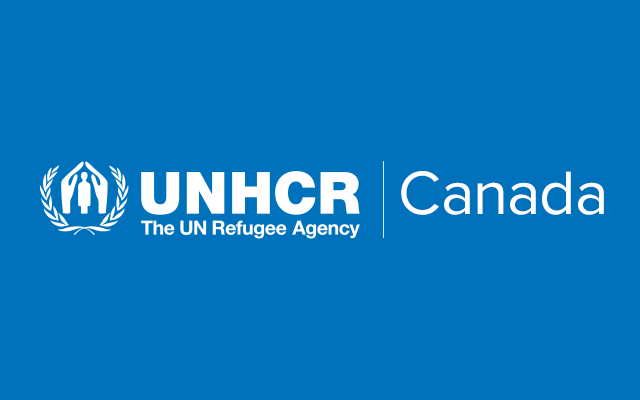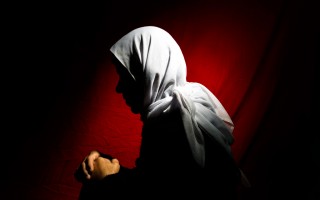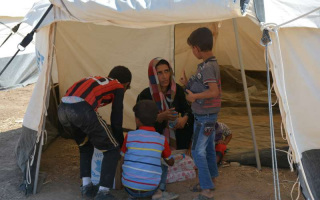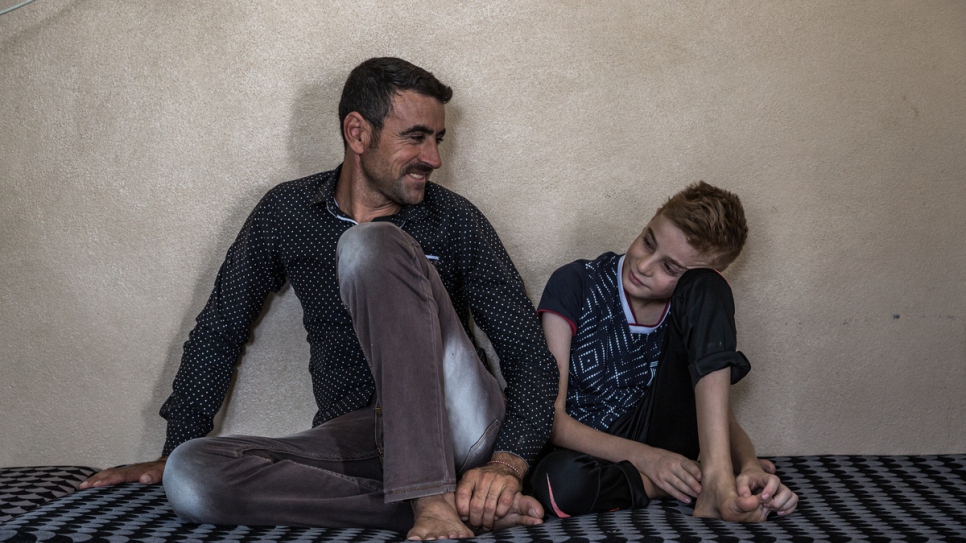
Hadi Tammo, 31, sits with his nephew Emad in a house in Dohuk, Kurdistan Region of Iraq. © UNHCR/Andrea DiCenzo
After being held captive by armed groups in Iraq for three years, 13-year-old Emad reunites with his mother in Winnipeg with UNHCR help.
Iraq: Cathy Otten, August 2017
Emad was kidnapped three years ago when armed groups attacked the town of Sinjar, 100 kilometres west of Iraq’s second city Mosul, and targeted the area’s minority Yazidi faith.
He was held captive and separated from his family, who had no idea that he was still alive. In July as the battle to retake Mosul raged, Emad was found beneath the rubble of the old city.
He was covered in dust and his small, emaciated body was wracked with injuries from shrapnel, bullets and bombs. He had only tiny morsels of food to eat in the two months before he was found, as Iraqi forces closed in on the old city in the west of Mosul.
The youngster was attempting to get a drink of water near one of the bridges that span the Tigris River, which bisects the city, when he was struck by a bullet. It was the last thing he remembers, and the culmination of his terrifying ordeal.
“Emad suffered a great deal … but thank God he is okay.”
He was subsequently reunited with his uncle, Hadi Tammo, 31, in this city in northwest Iraq. “Even though he’s injured, we’re very happy,” Tammo said.
One month after his escape, Emad’s wounds had been bandaged and he had been given a haircut. But he continued to wear a sad, tired expression not normally seen on children of his age. His wounded stomach, elbow and head continued to cause him pain.
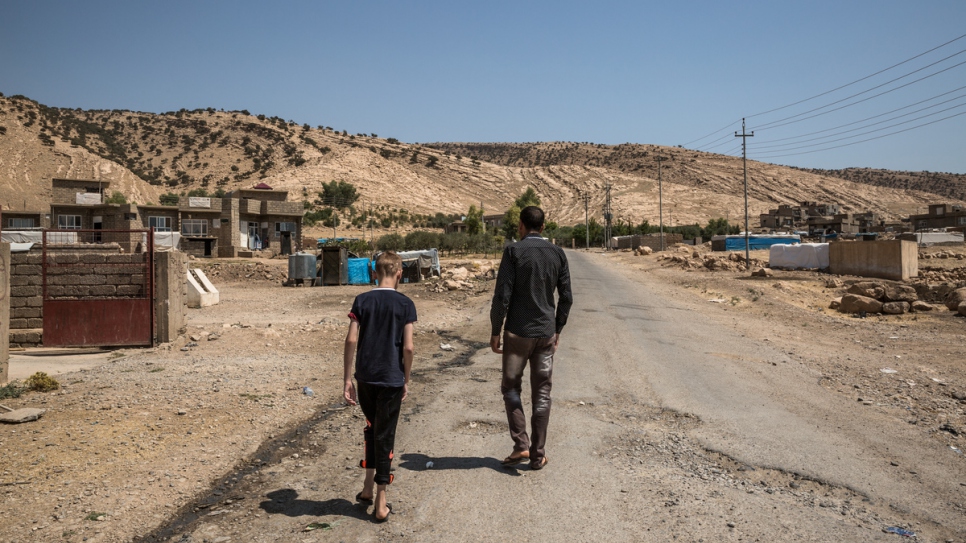
Hadi and his nephew Emad take a walk in the village where they stayed in Dohuk, Kurdistan Region of Iraq. © UNHCR/Andrea DiCenzo
“Emad suffered a great deal and his family were also captured,” said Hadi, whose children and wife were kidnapped by the extremists, before managing to escape from their ordeal last year. “He’s not feeling well, but thank God he is okay.”
The Yazidi community in Sinjar, northwestern Iraq, was targeted by extremists in 2014. Militants separated men and boys older than 12 years old from the rest of their families, and killed those who refused to adopt their beliefs.
More than 6,000 women and girls were kidnapped and sold as slaves, among them many of Emad’s relatives. Thousands of Yazidis were massacred or died of dehydration and exhaustion as they tried to escape the onslaught.
The UN has deemed their ordeal an ongoing genocide that amounts to crimes against humanity and war crimes.
After the attack, the life of Emad’s family, and the lives of many other families like theirs, changed forever.
Emad’s mother managed to escape captivity in 2016, and earlier this year she was relocated to the Canadian city of Winnipeg with the help of UNHCR. When Emad was rescued in July, UNHCR connected the names of mother and child and realized who he was, said UNHCR resettlement specialist Sarah Webster.
The boy made his way to Canada on August 16, along with a UN minder and another Yazidi family who were also being relocated there. While in Dohuk, UNHCR arranged a meeting between Emad and the other family so that he would have some familiar faces on the flight.
“It was of utmost importance to us to get Emad back to his mother and siblings as soon as possible.”
“Family unity is one of the most important principles for UNHCR. The family provides a really important support network for people who have been through what Emad has been through,” Webster said, a few days before Emad’s departure. “It was of utmost importance to us to get Emad back to his mother and siblings as soon as possible.”
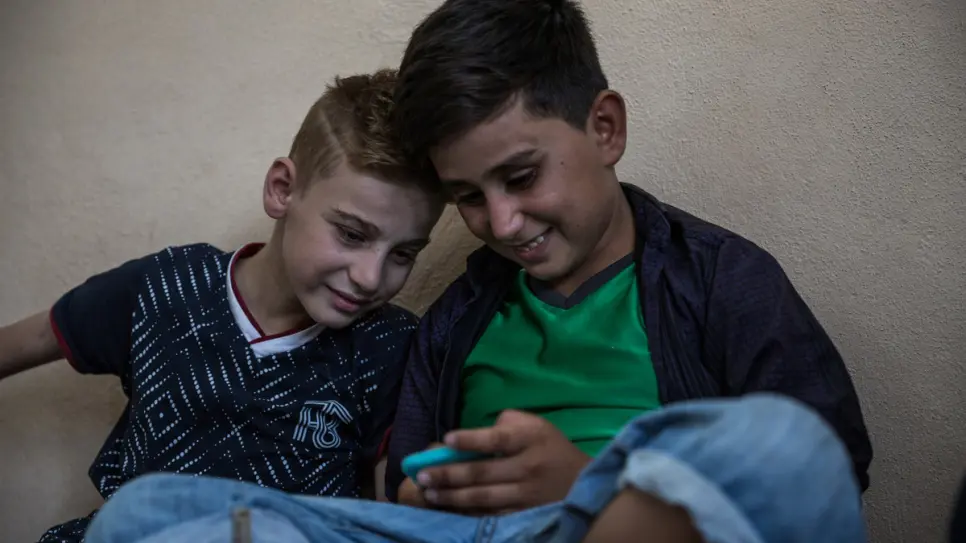
Yazidi boy Emad Tammo (left) watches video games on his cousin’s cellphone as he counts down the days in Dohuk, Kurdistan Region of Iraq, before rejoining his mother in Canada. © UNHCR/Andrea DiCenzo
The youngster was so excited by the prospect of being reunited with his mom that he had his bags packed days in advance.
“He can’t wait to see his mother again after three horrific years apart,” said his uncle Hadi. “When Emad first talked to his mother they were both very happy. It was like Emad was waking up from a grave. He was almost dead. He had been injured in his belly. But for his mom, she was just very happy. It was like Emad was reborn.”
Following his ordeal, Emad could hardly communicate when he met his relatives again because his captors had forced him to speak Arabic and not his native Kurdish. “We want him to go to school so his mind will be clear and then he can move forward with a new life,” said Hadi.
Once he is settled in Canada he will be assessed and will receive specialized care which is limited or unavailable in Iraq.
“Children who were held in captivity for long periods of time have been subject to a range of things, such as forced labour, forced conversion, physical and psychological abuse, on top of that separation from their family members,” said Webster.
“Our first priority is to reunite them with their family members so that they can at least relieve this stress and separation, and then we start to focus on recovery and access to specialized services, like Emad will have in Canada.”
Article originally posted on unhcr.org
Donate to help refugees in Iraq today


